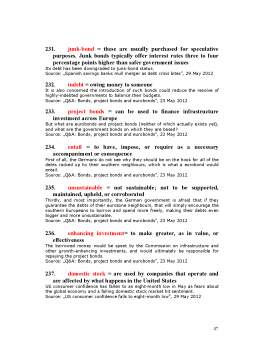Extras din curs
1. deleveraging = to repay a company's debts in order to make it more attractive to investors. Companies acquire leverage (or debt) to expand operations in the most efficient way possible. However, acquiring too much debt may increase the company's risk so that it may be in danger of default or bankruptcy. Deleveraging reduces these risks.
Since so many small banks have now tapped LTRO, hopes are rising that as well as slowing the pace of bank deleveraging and propping up sovereign-bond markets, the liquidity may encourage new lending to the real economy.
Source: “The euro crisis – A firewall full of holes”, Mar 3rd
2. escrow accounts = funds placed in trust with a third party, by a borrower for a specific purpose and to be delivered to the borrower only upon the fulfillment of certain conditions.
When you make your monthly mortgage payment, you're paying principal and interest, plus one-twelfth of your annual property tax and homeowner's insurance (PITI). The tax and insurance payments go into an escrow account and the mortgage lender pays your taxes and insurance when they are due.
Source: “Escrow Account Review”, Dec 30 2007
3. seed capital = money used for the initial market research and/or operations for a company. Seed money is vitally important because, without it, a company can hardly come into being, let alone become successful. It may come from a loan, and initial public offering, or from another source. For example, it is famously said that Ross Perot established Electronic Data Systems with $1,000 in personal savings; in this case, Perot's savings account contained his seed money
Raising Seed Capital Now: 10 Tips - Investors and entrepreneurs who won at the fundraising game during and after the Great Recession offer advice on landing equity money
Source: “Small Business Financing”, February 18, 2011
4. tax bracket = tax brackets are the divisions at which tax rates change in a progressive tax system (or an explicitly regressive tax system, although this is much rarer). Essentially, they are the cutoff values for taxable income - income past a certain point will be taxed at a higher rate.
Through the end of this year those in an ordinary income tax bracket of 15% or below can sell stock at a 0% gains rate.
Source: “Why you should dump your stocks and sell your business now”, April 23rd
5. labour market = in economics, labour is a measure of the work done by human beings. It is conventionally contrasted with such other factors of production as land and capital. There are theories which have developed a concept called human capital (referring to the skills that workers possess, not necessarily their actual work), although there are also counter posing macro-economic system theories that think human capital is a contradiction in terms
Europe’s labour markets have favoured older workers at the expense of younger ones.
Source: “Building competitiveness – Insider aiding”, Feb 25th
6. revolving line of credit = in commercial banking is a contractual agreement between a bank and, usually, a company where the bank agrees to provide loans up to a specified maximum over a specified period, usually a year or more. In consumer banking, it is a loan account requiring monthly payments less than the full amount of the loan, and the balance is carried forward with a finance charge on that balance
The United States is hooked on revolving credit. In June 2007, the total consumer revolving debt in the United States topped $900 billion. The good news is that 40 percent of credit card holders pay their full balance every month. The bad news is that a significant number of Americans have been caught in the revolving credit trap. Over 8 percent carry balances over $9,000, and one in six families pay only the minimum amount due every month
Source: “How Revolving Credit Works”
http://money.howstuffworks.com/personal-finance/debt-management/revolving-credit2.htm
7. accounts payable to sales = measures the speed with which a company pays vendors relative to sales. Numbers higher than typical industry ratios suggest that the company is using suppliers assets (cash owed) to fund operations.
Your accounts payable procedure is a bit different then the other processes we have examined so far. The first three processes we looked at represented processes where the focus was on reducing the size of assets (inventory or accounts receivable procedure) or expenses (marketing) and increasing the velocity or cycle time.
Source: “Strategies for Writing Accounts Payable Procedures”
8. assets held for sale = are those assets, primarily long-term assets, that an entity wishes to dispose of or liquidate through sale to others.
Where an asset (or disposal group) is classified as held for sale, then depreciation of such an asset or disposal group must cease as soon as it is classified as held for sale. The asset (or disposal group) should be carried in the statement of financial position (balance sheet) at the lower of the carrying amount in the statement of financial position (balance sheet) and fair value less costs to sell.
Source: “IFRS 5 – Non-Current Assets Held for Sale and Discontinued Operations” April 18th
9. volatility risk = the risk that a specific security price will increase or decrease by greater increments than the general market.
Using a sample of S&P 500 index options, we provide empirical tests that have the following general results. First, the delta-hedged strategy underperforms zero. Second, the documented underperformance is less for options away from the money. Third, the underperformance is greater at times of higher volatility. Fourth, the volatility risk premium significantly affects delta-hedged gains even after accounting for jump-fears. Our evidence is supportive of a negative market volatility risk premium.
Source: “Delta-Hedged Gains and the Negative Market Volatility Risk Premium (2001)”
Preview document
Conținut arhivă zip
- Dictionar Englez de Business.doc











































































